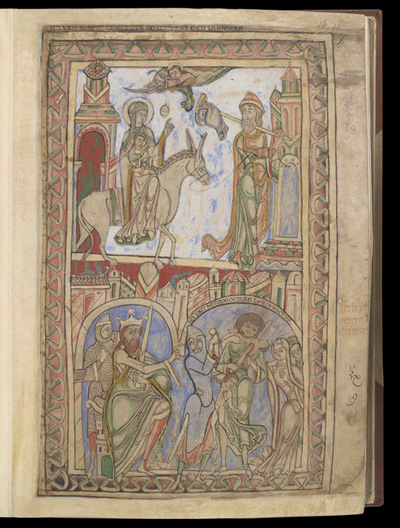Javascript must be enabled to continue!
Flight into Egypt, and Massacre of the Innocents, in The Winchester Psalter
View through Europeana Collections
Traditionally called the 'St Swithun Psalter'
because it contains a prayer to the saint, this psalter's origins
can be placed at Winchester, probably at the Cathedral Priory,
which is dedicated to him. It is beautifully illustrated with a
series of full-page tinted drawings which probably reflect the
tastes and high social status of Hugh of Blois, Bishop of
Winchester (1129-1171), patron of the arts, and brother of King
Stephen. Hugh had been a monk at Cluny where sumptuous visual art
abounded. The psalter, though, was made in England, having some
details which relate back to 11th Anglo-Saxon manuscripts. Hugh of
Blois may have used it as a prayerbook either privately or during
the daily monastic prayers called the divine office. The full-page
pictures are framed with patterned borders, sometimes shaded to
look three-dimensional, and usually are divided into two or more
panels, each of which in turn has one or more scenes. Here at the
top, Jesus, Mary and Joseph are escorted by an angel who wafts
incense as they flee to Egypt. Below, Herod commands his depraved
solders to massacre the innocent first-born. Although written
before the birth of Jesus, the psalms were illustrated as
prophecies of Christ and Christianity.
Title: Flight into Egypt, and Massacre of the Innocents, in The
Winchester Psalter
Description:
Traditionally called the 'St Swithun Psalter'
because it contains a prayer to the saint, this psalter's origins
can be placed at Winchester, probably at the Cathedral Priory,
which is dedicated to him.
It is beautifully illustrated with a
series of full-page tinted drawings which probably reflect the
tastes and high social status of Hugh of Blois, Bishop of
Winchester (1129-1171), patron of the arts, and brother of King
Stephen.
Hugh had been a monk at Cluny where sumptuous visual art
abounded.
The psalter, though, was made in England, having some
details which relate back to 11th Anglo-Saxon manuscripts.
Hugh of
Blois may have used it as a prayerbook either privately or during
the daily monastic prayers called the divine office.
The full-page
pictures are framed with patterned borders, sometimes shaded to
look three-dimensional, and usually are divided into two or more
panels, each of which in turn has one or more scenes.
Here at the
top, Jesus, Mary and Joseph are escorted by an angel who wafts
incense as they flee to Egypt.
Below, Herod commands his depraved
solders to massacre the innocent first-born.
Although written
before the birth of Jesus, the psalms were illustrated as
prophecies of Christ and Christianity.
Related Results
Crucifixion, The Arundel Psalter f.52v
Crucifixion, The Arundel Psalter f.52v
Probably made at Winchester, although it is not
certain by or for which religious house there, the Arundel Psalter
seems to have been a personal prayerbook. Throughout the middle
a...
Poussin's "Massacre of the Innocents" in the Justiniani Palace, Rome
Poussin's "Massacre of the Innocents" in the Justiniani Palace, Rome
Print after Fragonard's desgin of Poussin's "Massacre of the Innocents"...
X-radiograph(s) of "Massacre of the Innocents"
X-radiograph(s) of "Massacre of the Innocents"
X-Radiograph Description: X-Radiograph
X-Radiograph Settings: 5 ma, 45 kv, 1 min.; #1:LL and LR; #2:LCL; #3:LCR; #4:UL and UR; #5:UCL; #6:UCR
Burroughs Number: 4640
X-Radi...
Gold rings in Winchester Cathedral
Gold rings in Winchester Cathedral
The drawing shows three gold rings, Medieval - 16th century, ascribed to Bishops of Winchester and to William Rufus....
Eisodia tis Theotokou Tsiatsapa, Kastoria, Greece
Eisodia tis Theotokou Tsiatsapa, Kastoria, Greece
Narthex, Flee of Elizabeth and Massacre of Zacharia...



